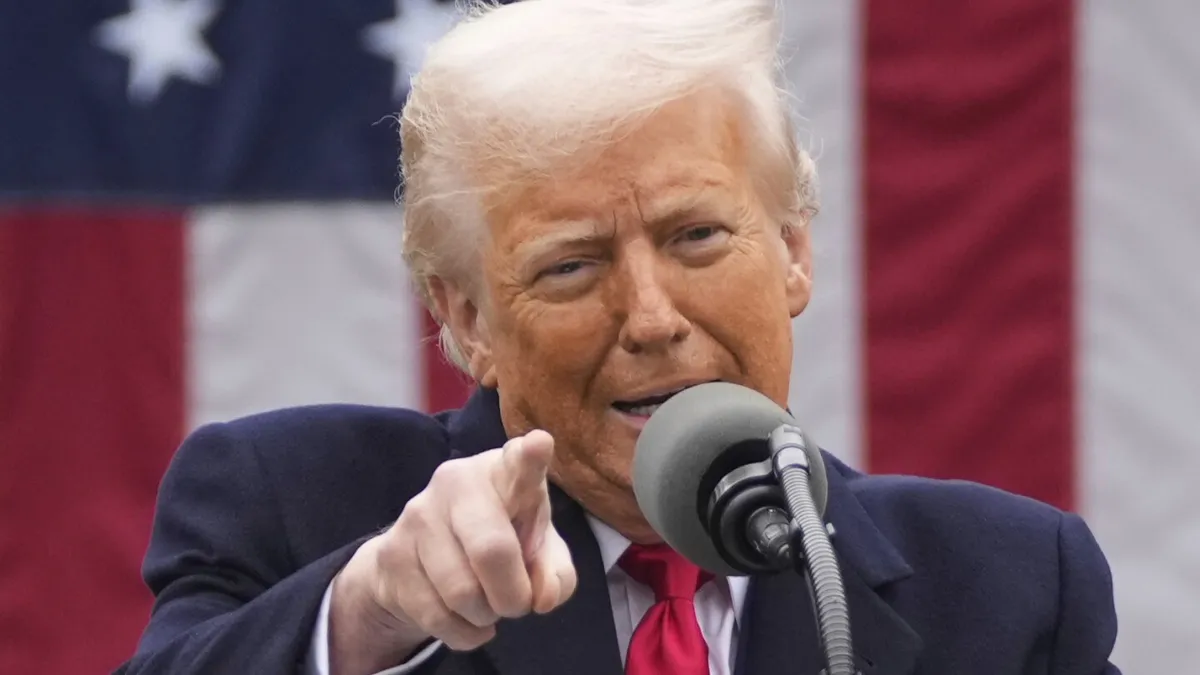
In a bold move that has sent ripples through the global economy, President Donald Trump has declared a trade war, igniting panic in financial markets and increasing the risk of a recession. This aggressive stance has disrupted long-standing political and economic alliances that were pivotal in stabilizing the world post-World War II. As of midnight Wednesday, Trump's latest round of tariffs has gone into full effect, imposing higher import tax rates on a multitude of countries and territories.
Economists are left puzzled as President Trump attempts to overhaul the existing economic framework shortly after inheriting the strongest economy in the world. Many of the trading partners he accuses of exploiting U.S. businesses and workers were already facing economic challenges. Eswar Prasad, a trade policy professor at Cornell University, highlights the irony of Trump's claims against an American economy that was flourishing while other major economies were stalling. “The Trump tariffs are likely to end America’s remarkable run of success and crash the economy, job growth, and financial markets,” Prasad warns.
President Trump and his trade advisors assert that the current rules governing global commerce place the United States at a significant disadvantage. However, mainstream economists, often dismissed by Trump, argue that the president's understanding of global trade is flawed, particularly his fixation on trade deficits, which do not inherently hinder economic growth. The administration contends that other nations erect unfair trade barriers to stifle American exports and employ dubious tactics to bolster their own economies.
In Trump's narrative, his tariffs represent a long-overdue reckoning, positioning the U.S. as a victim of economic exploitation by countries like Europe, China, Mexico, Japan, and even Canada. While it is true that some nations impose higher taxes on imports, manipulate currencies, and provide subsidies to their industries, the United States remains the second-largest exporter globally, trailing only China. In 2023, the U.S. exported a remarkable $3.1 trillion in goods and services, outpacing third-place Germany, which stands at $2 trillion.
The fear that Trump's remedies may be more harmful than the issues they aim to address has led to a significant sell-off in American stocks. Following the announcement of sweeping import taxes on April 2, the S&P 500 index has plummeted by 12%. Despite the high trade deficits, the U.S. economy remains robust, prompting Trump and his advisors to point to these imbalances as evidence of foreign exploitation. The president seeks to restore equity and recover millions of lost American factory jobs through import taxation rates not seen since the early 20th century.
The United States has been the wealthiest major economy globally, a fact that contradicts Trump's narrative. The International Monetary Fund predicted in January that the U.S. would outpace all other major advanced economies in growth for the year. While China and India have experienced faster growth over the past decade, American living standards remain superior. The decline of U.S. manufacturing can be traced back decades, exacerbated by the influx of cheap imports following China’s accession to the World Trade Organization in 2001.
To reverse this trend, Trump has consistently resorted to tariffs as his primary economic strategy. Since his return to the White House, he has imposed 25% taxes on foreign cars, steel, and aluminum, in addition to 20% tariffs on Chinese imports. The introduction of 10% "baseline" tariffs on a broad range of goods has intensified concerns among economists. Trump views tariffs as a comprehensive solution designed to protect American industries, stimulate domestic manufacturing, and generate revenue for the U.S. Treasury.
Despite Trump's assertions, economists emphasize that a trade deficit does not necessarily indicate national weakness. The U.S. economy has nearly quadrupled in size, adjusted for inflation, during the past fifty years, even amidst ongoing trade deficits. According to Maurice Obstfeld, former chief economist at the IMF, trade deficits do not equate to economic decline; rather, they can reflect a growing economy, as higher consumer demand typically leads to increased imports.
America's trade deficit is largely a result of the nation’s low savings rate and high consumption levels. The U.S. trade deficit reached a record $945 billion in 2022, as the economy rebounded from COVID-19 lockdowns. Economists argue that trade deficits are not primarily the result of unfair practices by other countries but stem from American consumers’ tendency to spend beyond their means. If the U.S. increased its savings—potentially by reducing budget deficits—it could mitigate its trade deficit.
The influx of foreign investment, driven by the U.S.'s propensity for consumption, is a significant counterpoint to the narrative of economic victimhood. In 2023, direct foreign investment in the U.S. totaled $349 billion, nearly double that of Singapore. Some economists warn that the only scenario in which tariffs could reduce the U.S. trade deficit is if they lead to a dramatic decline in investment, which would be catastrophic for the economy.
In conclusion, while Trump's tariffs may be intended as a remedy for perceived economic injustices, many experts argue they create uncertainty and alienate critical allies. The consensus is that a well-designed industrial policy, coupled with selective tariffs, could foster increased investment in manufacturing rather than the widespread uncertainty generated by current policies.